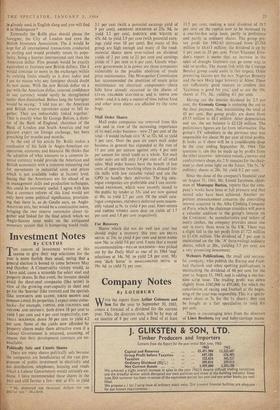Investment Notes
By CUSTOS
THE custom of investment writers at this season to give their nap selections for the year is more foolish than usual, seeing that a general election is bound to come between May and October. A Conservative victory would, as I have said, cause a scramble for select steel and property shares. In that event, the investor should avoid the sheet-steel companies (like scow) in view of the growing over-capacity in sheet and go for the `heavies' (like UNITED) and the specials (like STEWARTS AND LLOYD, FIRTH BROWN and DORMAN LONG). In properties, I expect some come- backs-for example, CAPITAL AND COUNTIES and CENTRAL AND DISTRICT, both down 18 per cent to yield 3 per cent and 4 per cent respectively, COP- TRAIL HOLDINGS, down 30 per cent to yield 4.2 Per cent. Some of the yields now afforded by property shares make them attractive even if a Labour Government is returned, assuming, of course, that their development contracts are un- assailable.
Politically Safe and Unsafe Shares There are many shares politically safe because the companies are beneficiaries of the vast pro- gramme of public investment in electricity and gas distribution, telephones, housing and roads which a Labour Government would certainly en- dorse. I have recommended these shares in the past and still favour a few-Buc at 87s. to yield
* He disbursed ten thousand dollars for our ge 11.ra use.'-Macbeth. 3.1 per cent (with a potential earnings yield of 9 per cent), ABERDARE HOLDINGS at 23s. 9d. to yield 3.1 per cent, BABCOCK AND WILCOX at 45s. 6d. to yield 3.9 per cent (with potential earn- ings yield over 10 per cent). But many of this group are high enough and many of the road- material shares seem over-valued on dividend yields of 2 per cent to 21 per cent and earnings yields of 5 per cent to 6 per cent. Unsafe what- ever government is in power are those companies vulnerable to the possible abolition of resale price maintenance. The Monopolies Commission has recommended the abolition of resale price maintenance on electrical components-sharp falls have already occurred in the shares of LUCAS, CHLORIDE ELECTRICAL and S. SMITH AND SONS-and it is only a matter of time before food and other store shares are affected by the same bogy.
Mail Order Shares
Mail order companies are removed from this risk and in view of the increasing importance of its mail order business-now 27 per cent of the total-1 would include Gus `A' at 52s. 6d. to yield 3 per cent. Over the past six years mail order business in general has expanded at the rate of 13 per cent per annum against only 4 per cent per annum for retail trade as a whole. Yet mail order sales are still only 3.4 per cent of all retail sales. Mail order houses have the benefit of low costs of operation (working often in disused tex- tile mills with low rateable value) and use the GPO to handle their deliveries. The big cata- logue companies are preferable and 1 can recom- mend FREEMANS, which were recently issued to the public by tender at 33s. and are now quoted at 40s. to yield 2.7 per cent. Of the small cata- logue companies, OXENDALE deferred seem reason- ably valued at 9s. to yield 4 per cent, JOHN MYERS and EMPIRE STORES seem dear on yields of 1.7 per cent and 1.8 per cent respectively.
For Recovery
Shares which did not do well last year but should enjoy a recovery this year are DELTA METAL at 24s. to yield 4 per cent and REED PAPER now 56s. to yield 5.6 per cent. I note that a recent recommendation-PILLAR HOLDINGS-was picked out by the Daily Mail as one of its 1964 'nap' selections at 14s. 9d. to yield 2.8 per cent. My OWn. 'dark horse' is AMALGAMATED METAL at 39s. 6d, to yield 5i per cent.






























 Previous page
Previous page